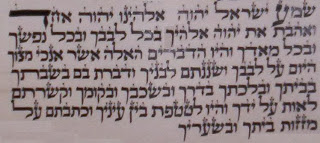Was this a
paraphrase of a providential directive by a specially chosen servant, or the direct
words of God? Moses spoke most of the original words of the song “Hear, O
Israel” (see all of the words of this command in Hebrew here)
to a nation,
followed centuries later by the Son of God who was also speaking to a nation. Did
the words sink in? One can hear them, but doing them… How would you or I behave
as we prepared to accept an inheritance larger than anything we could ever imagine,
with the only stipulation being unswerving loyalty to the one with the key to
the bank? Hmmm. That might be a tough choice, if you think about it. Or is it?
Moses was
telling the people he’d led to the edge of their new home some very important
words, so important that another of God’s representatives – His own son – would
discuss them again some fourteen centuries later. Moses was a very old man by the time he said ‘Hear,
O Israel’ outside of the perimeter of Canaan (Deuteronomy 6:4-5). He’d been
through so much to bring the people out of bondage and entreat them to
obedience. It must have also been a somewhat bitter irony for this 120-year old
to speak these words, as he himself would not be allowed to enter the land
because of a mistake he’d made in regard to obedience (Numbers 20:9-12; Num.
27:12-14). Were they in fact his own interpretation of what God told him to
say, or God’s own words that he was merely repeating? Moses indicates that
these are in fact God’s words (Deut. 6:1-2), and he would have undoubtedly been
quite reluctant to alter them significantly. The Lawgiver’s words are recalled by Jesus
over 1,400 years later as he taught some devout lawyers – the Pharisees. He
adds something to what Moses had said, something about how to love a neighbor
(Matthew 22:37-38; Mark 12:29-30; Luke 10:27; Leviticus 19:18). Why’d He do
that? Could it be that the omniscient God – Jesus – knew honoring God and treating
fellow humans charitably were not always congruous? What happens when some of
us are very good at following His rules, and likewise good at catching others
who’re not so good? Sound at all like the 1st Century, perhaps? Or
even the 21st Century?
The
challenge in hearing what He directs is that it doesn’t stop there. I must do
it. And, there’s that word all. It’s
so small, but it does make this command rather comprehensive. All heart, all
soul, all strength, all mind. All of me
needs to engage in this imperative. It’s called ‘the Shema’ – Hear. First
spoken by Moses, it was a lesson he must have wondered ‘Will this really sink
in? Will they remember that I tried and failed at this?” Love. All. They’re
small words. Try ‘em out.
There is no source for the song story, but for background on
the song, see the New International
Version Study Bible, general editor Kenneth Barker, 1985, copyright The
Zondervan Corporation, for notes on Deuteronomy chapter 6, verses 1-5, and other
scriptures therein.





